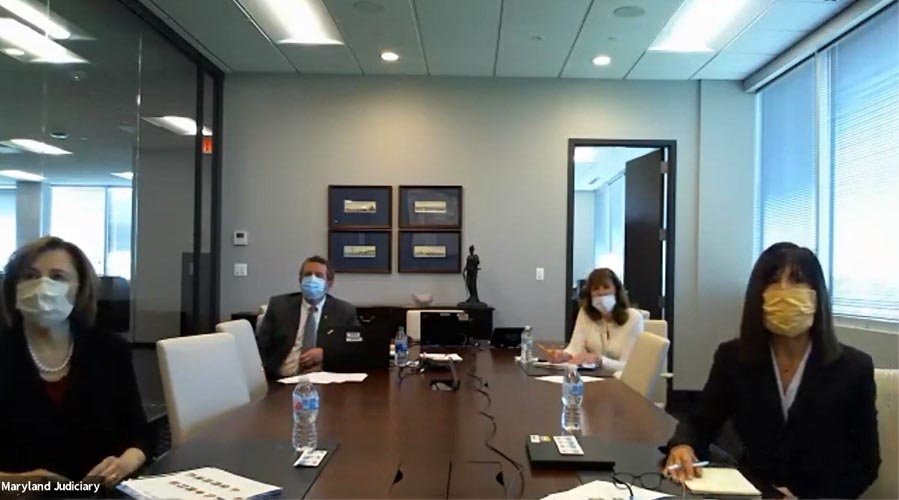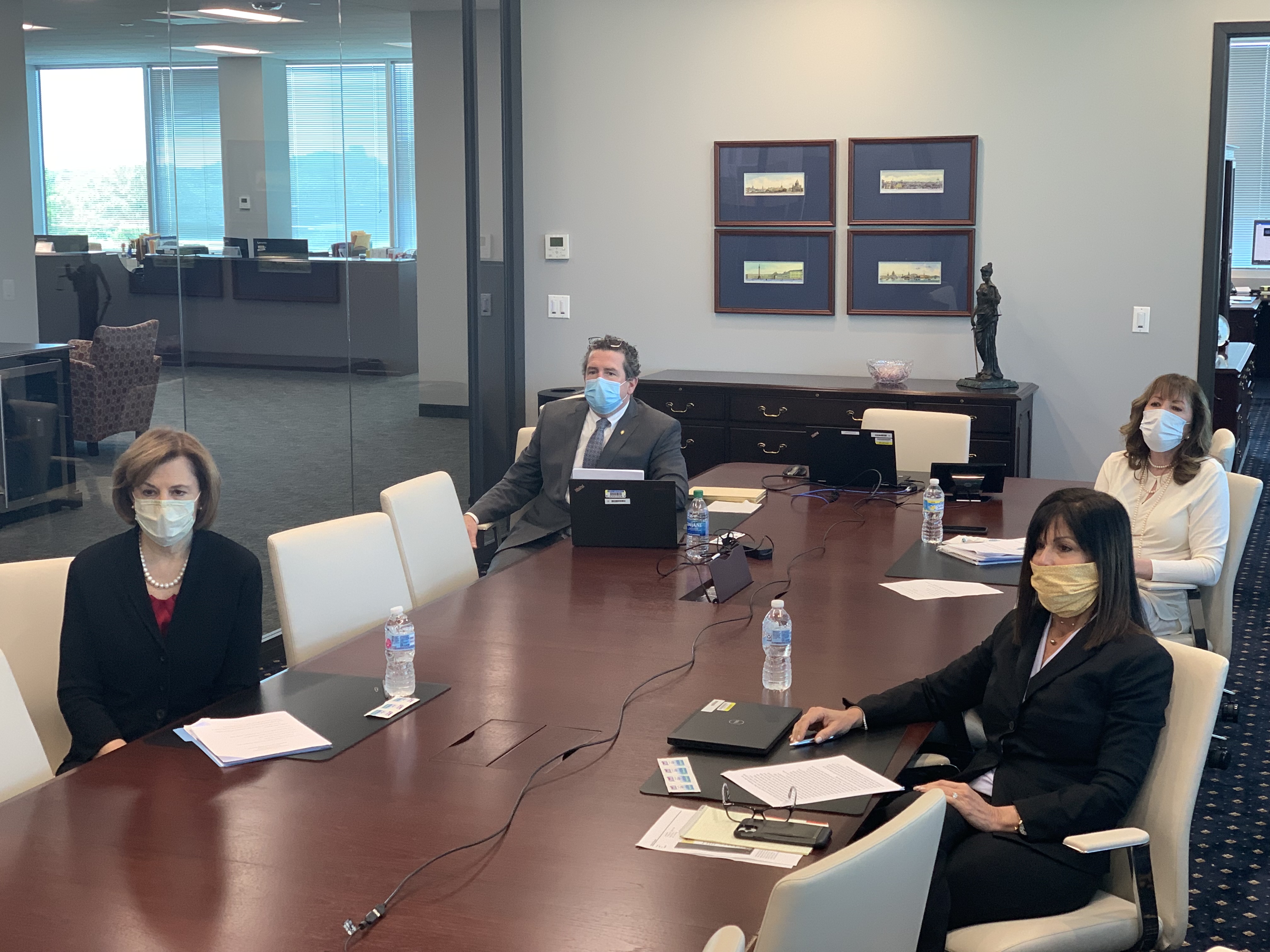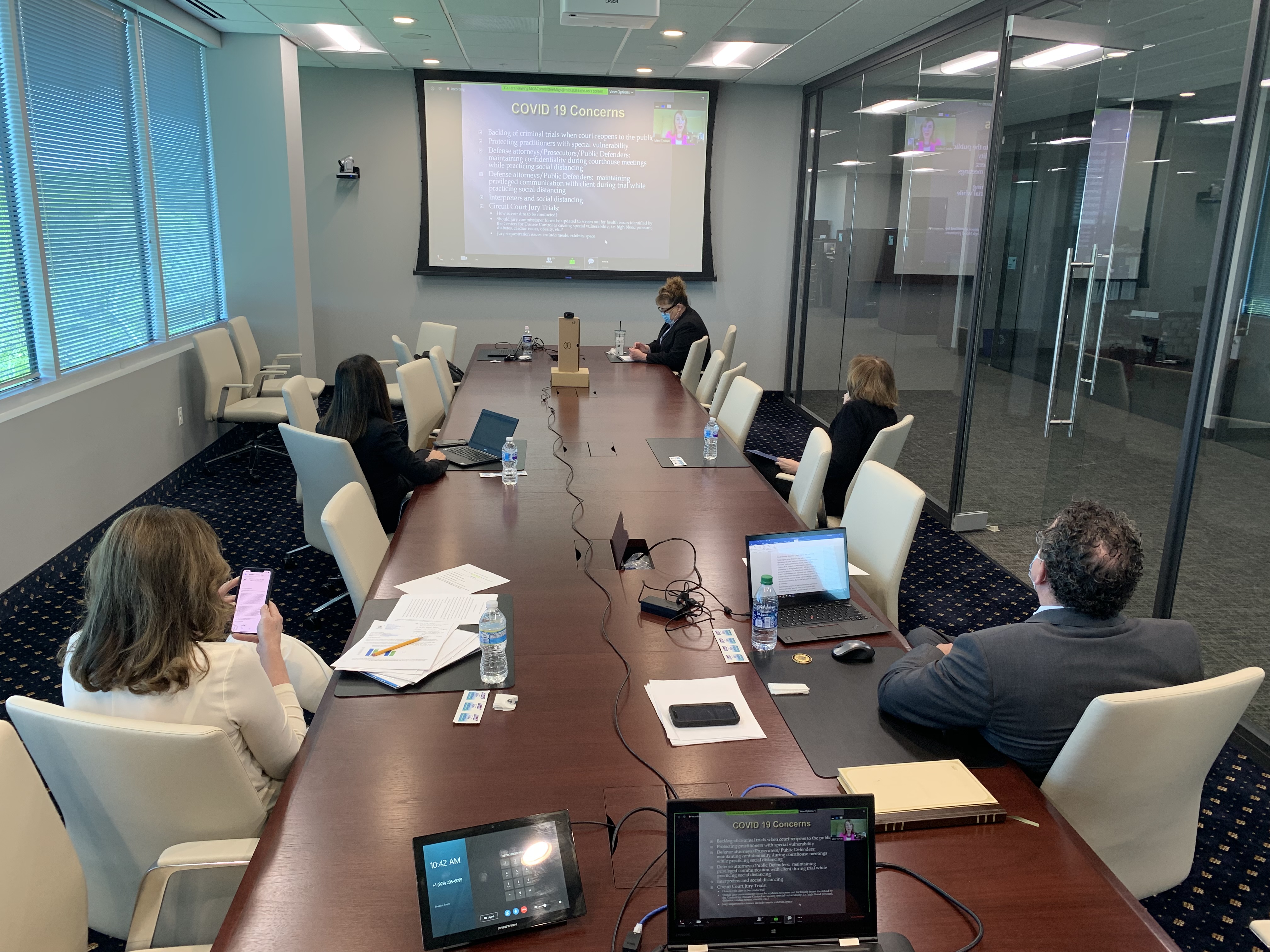187 Harry S. Truman Parkway
Annapolis, Maryland 21401
410-260-1488
Maryland Judiciary briefs Maryland Senate Judicial Proceedings Committee on the courts amid COVID-19
ANNAPOLIS, Md. – On May 7, top leadership from the Maryland Judiciary participated in a virtual briefing with the Maryland Senate Judicial Proceedings Committee regarding the impact of COVID-19 on the courts and the criminal justice system.
“This hearing is a way for us to get a little more of the ground truth of what is actually happening and then some of the innovative ways that our system in responding to the needs to make sure we keep our business going,” said Maryland Sen. William Smith, District 20, and Chair of the Judicial Proceedings Committee.
Donning facial coverings and sitting six feet apart inside of a conference room in Annapolis, Chief Judge Mary Ellen Barbera, Maryland Court of Appeals, Judge Laura Ripken, Administrative Judge for the Fifth Judicial Circuit and Chair of Conference of Circuit Judges, Chief Judge John P. Morrissey, District Court of Maryland, and Pamela Harris, State Court Administrator briefed the committee on the necessary and appropriate steps the Judiciary has taken since early March when the COVID-19 pandemic hit Maryland and how the Judiciary intends on reopening the courts in the weeks and months to come.

“The judicial branch, during these unprecedented and challenging times, is carrying out core functions,” said Chief Judge Barbera. “We are also hard at work planning a phased return to full function.”
Chief Judge Barbera issued the Judiciary’s first two administrative orders related to COVID-19 on March 12. Those orders restriced non-essential judicial activities and suspended jury trials. On March 13, Chief Judge Barbera also issued another administrative order closing the courts to the public, except for emergency proceedings.
“Those orders take into account the actions of the governor, as well as the advice of the federal Centers for Disease Control and the Maryland Department of Health,” said Chief Judge Barbera. “They allow courts to perform essential functions, while adhering to the mandates of due process and the rule of law.”
Since March 16, the Maryland state courts have been minimally staffed with essential employees to hear certain emergency court matters, as outlined in the orders, and to answer calls between 8:30 a.m. and 4:30 p.m. All other non-emergency court matters scheduled for a court hearing or proceeding have been, and will continue, to be postponed. As such, the Judiciary has transitioned from in-person hearings to online or remote hearings. Administrative orders have authorized the expanded use of remote technology for court proceedings to allow for that.
“We have learned the value of remote proceedings and plan to apply these lessons to future practices and procedures,” said Chief Judge Barbera. “We have seen the plea agreements, sentencings, bail reviews, and uncontested divorces conducted successfully on a remote basis.”
The Judiciary also emphasized on Thursday that it has been in ongoing communication throughout the past several weeks and months with the Maryland Departments of Health, Juvenile Services, Public Safety and Correctional Services, and General Services, as well as the governor’s legal counsel and the Office of the Attorney General to address issues and coordinate coronavirus response efforts.

At the local level, administrative judges continue to work with justice partners to expand technology to expedite remote hearings as permitted through the administrative orders. The Judiciary continues to be in direct contact with the Maryland State Bar Association and other state and local bar associations to open the lines of communications since the COVID-19 crisis is so fluid. As a result, some judges have attended “town hall” meetings with their local bar associations to share Judiciary information and answer questions.
Daily operations of essential functions have continued within the 24 circuit courts in Maryland, including bail reviews, arraignments of all detained individuals, juvenile detention hearings, juvenile shelter care hearings, juvenile respondent peace orders, emergency evaluations, preparation for quarantine and isolations petitions, extraditions, body attachments, extreme risk protective order appeals, Children in Need of Assistance (CINA) matters, emergency delinquency hearings, emergency habeas corpus petitions, guardianship matters, domestic violence protective orders, peace order appeals, emergency family law matters, temporary restraining orders, criminal competency matters, emergency motions and contempt proceedings, and all matters consistent with the administrative order issued April 14 regarding incarcerated defendants.
The circuit courts continue to conduct remote hearings in cases, such as guilty pleas for detained defendants, remote drug court reviews, scheduling conferences and pre-trial settlement conferences in civil and family law cases, as well as temporary restraining orders.
“Along with our colleagues in the District Court, we all have daily duty judges available to law enforcement for search warrant review,” said Judge Ripken. “All proceedings are conducted remotely whenever possible using court approved technology.”
Judge Ripken chairs the Judiciary’s Conference of Circuit Court Judges and has held conference calls, three times a week, since the start of COVID-19 to ensure judges in the circuit courts are sharing ideas and best practices as they continue to navigate this crisis.
Daily operations of essential functions have also continued in the District Court of Maryland, including reviewing and processing domestic violence protective orders, peace orders, extreme risk protective orders, and emergency evaluations. District Court commissioners are handling all types of emergency petitions. If an emergency petition is granted, it is then screened by a judge to determine what other action is needed. Additionally, bail reviews, motions for bail modifications, and bail re-reviews are being heard daily. Criminal pleas are being handled remotely with state’s attorneys and public defenders working together to review pending actions to determine if the matters can be resolved.

Chief Judge Morrissey has also facilitated and hosted dozens of conference calls with administrative judges for each of the twelve districts and staff from District Court Headquarters (DCHQ) to receive timely updates on hearings and proceedings in the District Court thus far.
“During these conference calls, we discuss best practices, share new and ongoing concerns, and explore new and technology driven approaches to expanding our ability, both now and in the future, to conduct additional court business,” he said.
Looking to the future, Judiciary workgroups have been formed in both the District Court and the circuit courts to determine best practices and strategies for the safe reopening by phasing-in court functions. These workgroups are also mapping out courthouses, identifying courthouse areas for proper social distancing, and determining the maximum docket sizes that can be safely accomplished.
“The ability for the District Court to handle our high-volume dockets like traffic cases and landlord tenant dockets will be the most challenging, but we are exploring additional options to see if some of this workload can be streamlined or may be handled remotely,” said Chief Judge Morrissey. “I think that it is fair to say that business in the District Court will never be the same.”
DCHQ, along with the Maryland Judiciary’s Administrative Office of the Courts, continue to work with the Maryland Emergency Management Agency (MEMA) and outside vendors to obtain various types of personal protective equipment (PPE), including masks, gloves, face guards, no-contact digital thermometers, hand sanitizers and sanitizing wipes, Plexiglas sneeze guards, signage and six-foot separation markers ahead of the Judiciary’s reopening date.
Since the start of the COVID-19 public health emergency, the courts have implemented numerous safety procedures, including security screenings and face covering requirements, to help reduce the spread of the virus within courthouse locations across the state.
The Fourth Amended Administrative Order Expanding and Extending Statewide Judiciary Restricted Operations Due to the COVID-19 Emergency states that the courts will be closed through Friday, June 5, however, Chief Judge Barbera said in Thursday’s briefing that the next few weeks will dictate the courts exact plans for reopening.
“Even if that date holds, I can assure you this does not mean that Monday, June 8, 2020, will be ‘business as usual’ for the Maryland Judiciary,” she said. “We seek to have in place the safeguards necessary to protect, as much as we reasonably can, the health of the public, Judiciary personnel, and justice partners. We envision implementing a multi-phase approach by leveraging technology, incorporating social distancing, restructuring dockets, and re-thinking current business practices as we return to full functionality.”
The Maryland State Bar Association, Maryland State’s Attorney’s Association, Office of the Public Defender, Department of Public Safety and Correctional Services, and Maryland Chiefs of Police Association, Maryland Sheriff’s Association, and Maryland Correctional Administrators Association also participated in the briefing.
To view the full briefing:
For the latest updates regarding COVID-19 and the courts, go to:
https://mdcourts.gov/coronavirusupdate
To view the Maryland Judiciary’s timeline reflecting its response to COVID-19, go to: https://mdcourts.gov/sites/default/files/import/coronavirus/marylandjudiciarycovid19timeline.pdf
# # #
(May 7, 2020)
